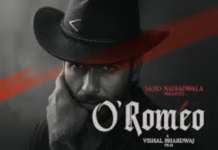Some stories urge us to suspend our disbelief and give in to their charm. Destiny and the power of love drive debut writer-director Shouryuv’s Telugu film Hi Nanna. This tale that introduces us to beautiful people in picture- perfect settings has a few nostalgic tropes such as a pet dog being a catalyst at crucial times. It is cinematic but comfortingly familiar. Hi Nanna . The leading man, actor Nani, portrays a single father, wearing his heart on his sleeve and making us well up in tears, and Mrunal Thakur revels in the portrayal of her layered characterisation. Hi Nanna Hesham Abdul Wahab’s background score is a foil to this tale that sometimes sounds improbable and demands that we set our cynicism aside. Does it work? How much one enjoys this film depends on whether we accept some of the reveals as the narrative progresses and embrace it with its rough edges.
Viraj (Nani) is a celebrity photographer in Mumbai, living with his six-year-old daughter Mahi (child actor Kiara Khanna) in a house that belongs to architecture magazines (production designer Avinash Kolla and cinematographer Sanu John Varghese whip up an aesthetic visual palette). Viraj’s calendar is choc-a-bloc but he tailors it around his daughter’s requirements. The first few minutes give us an idea of him being a hands-on father. Mahi’s small world with her father, grandfather (Jayaram), pet dog Pluto and Viraj’s friend and colleague Justin (Priyadarshi) looks nearly perfect. However, she is curious about her mother.
Shouryuv begins unpacking Viraj’s past in a fairytale manner, in a format that the father uses to tell his daughter bedtime stories, and slowly broaches the bittersweet portions. The writer-director hopes that his audience, too, will patiently listen in and not let the social media-driven short-term attention span get the better of them. He puts Viraj in a spot by making him narrate his past in the presence of Yashna (Mrunal Thakur, voice by Chinmayi), who has befriended Mahi minutes earlier. Slowly, the writer pulls a few tricks from his hat. Events leading up to intermission warrant us to embrace a few old world tropes, particularly about medical conditions and the play of fate.
Music composer Hesham Abdul Wahab is a big asset to the film. The songs are hummable and pleasant, but the background score takes the cake. When the strains of ‘Idhe idhe tholisariga…’ play at different points, it is impossible not to be moved. He also uses the calming notes of the waves and silences where essential.




